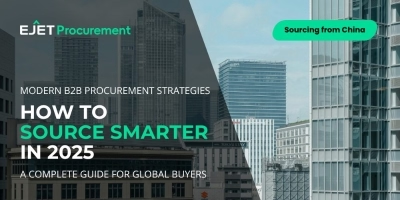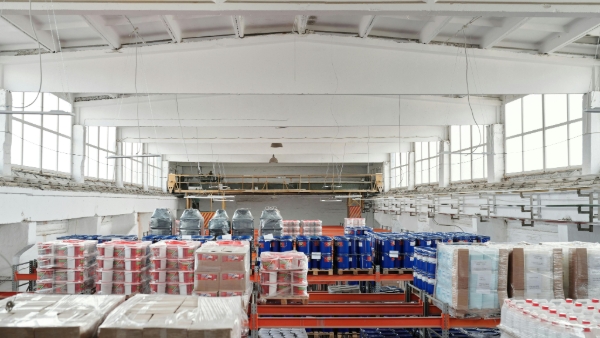Modern B2B Procurement Strategies: How to Source Smarter in 2025


As we approach 2025, the world of B2B procurement continues to evolve, driven by technological advancements, changing market dynamics, and growing pressures for businesses to improve operational efficiency. In today’s fast-paced business environment, it’s no longer enough to rely on traditional procurement methods. Companies must adopt modern B2B procurement strategies to stay competitive, optimize their sourcing, and build strong, resilient supply chains.
In this blog, we will explore the latest trends and strategies in B2B procurement, providing actionable insights on how businesses can source smarter, reduce costs, and enhance supplier relationships. Whether you're a procurement professional, business owner, or part of the supply chain team, understanding strategic sourcing B2B and embracing e-procurement trends is essential for success in 2025.
Procurement in the B2B sector has come a long way in the past few decades. Historically, businesses relied on personal relationships with suppliers, face-to-face negotiations, and manual paperwork to manage purchasing activities. While these methods worked for a time, they became increasingly inefficient as businesses grew and global supply chains expanded.
Today, B2B procurement has evolved into a more strategic, data-driven function that leverages technology to improve efficiency and reduce costs. In 2025, modern B2B procurement strategies emphasize automation, data analytics, and supplier collaboration. Companies increasingly adopt e-procurement trends and digital tools to streamline procurement processes, improve transparency, and enable smarter decision-making.
The key to successful B2B procurement in 2025 lies in the ability to adapt to these changes while maintaining strong relationships with suppliers, managing risks, and focusing on long-term sustainability.

At the heart of modern B2B procurement is strategic sourcing B2B. This approach involves a comprehensive analysis of the supply market, the identification of the best suppliers, and the development of long-term, mutually beneficial relationships. In contrast to traditional procurement, which focuses primarily on transactional purchasing, strategic sourcing B2B aims to optimize the entire supply chain by focusing on cost savings, supplier collaboration, and value creation.
One of the most significant benefits of strategic sourcing B2B is the ability to align procurement goals with overall business objectives. By taking a more strategic approach, companies can not only lower costs but also improve the quality of products, enhance supplier innovation, and reduce supply chain risks.
In 2025, strategic sourcing B2B will continue to play a crucial role in helping businesses navigate the complexities of a global supply chain. The integration of advanced data analytics and artificial intelligence will further enhance strategic sourcing by providing real-time insights into supplier performance, market trends, and demand forecasting.
For many businesses, purchasing in bulk is a key strategy for reducing costs and ensuring a consistent supply of goods. However, managing bulk purchases efficiently is not as simple as placing large orders and waiting for delivery. In 2025, businesses will adopt more advanced bulk purchasing management strategies that focus on optimizing inventory, improving supplier relationships, and managing risks associated with large orders.
Effective bulk purchasing management involves careful planning, forecasting, and supplier collaboration. Companies are using B2B supply chain solutions to monitor stock levels, track demand patterns, and ensure that they are ordering the right quantity of goods at the right time. Advanced procurement software enables businesses to automate inventory management, streamline the ordering process, and reduce the risk of overstocking or stockouts.
By integrating B2B supply chain solutions with procurement functions, businesses can also improve collaboration with suppliers, ensuring that they are meeting deadlines and delivering products on time. The result is more efficient bulk purchasing management, which helps reduce costs and improve overall supply chain performance.

As technology continues to evolve, e-procurement trends are reshaping how businesses manage procurement. E-procurement refers to the use of digital platforms and tools to manage the entire procurement process, from supplier selection and purchase orders to invoicing and payment.
In 2025, e-procurement will continue to be a driving force in B2B procurement. The rise of cloud-based procurement solutions, artificial intelligence (AI), and machine learning will allow businesses to automate routine tasks, improve data accuracy, and enhance decision-making. E-procurement trends will focus on increasing transparency, improving supplier performance, and providing real-time insights into procurement activities.
One of the most significant benefits of e-procurement is the ability to integrate procurement processes with other business functions, such as finance and inventory management. This integration enables businesses to streamline operations, reduce manual effort, and improve cross-department collaboration. As more businesses embrace e-procurement trends, we can expect to see continued advancements in procurement automation and digital tools that will help businesses source smarter in 2025.
When it comes to sourcing products for wholesale purposes, businesses need to ensure that they are getting the best value for their money. Smarter wholesale procurement involves more than just finding the lowest price—it requires strategic decision-making, careful supplier selection, and a focus on long-term relationships.
In 2025, the availability of data and analytics tools will allow businesses to make more informed procurement decisions. By leveraging technology to track supplier performance, monitor market trends, and analyze demand patterns, companies can make smarter sourcing decisions. This data-driven approach helps businesses identify opportunities for cost savings, optimize inventory levels, and ensure that they are working with the best suppliers for their needs.
Effective supplier relationship management (SRM) is essential for successful B2B procurement. Building strong, long-term relationships with suppliers can lead to better pricing, improved product quality, and faster response times. In 2025, SRM will continue to be a key strategy for businesses looking to gain a competitive advantage.
By working closely with suppliers, businesses can negotiate better terms, collaborate on product innovations, and manage risks more effectively. SRM also helps businesses ensure that suppliers are meeting their quality standards and providing timely deliveries, reducing the risk of supply chain disruptions.
Sustainability is becoming an increasingly important factor in wholesale procurement. Consumers and businesses alike are demanding more eco-friendly products and sustainable practices across the supply chain. In 2025, businesses that prioritize sustainability in their procurement strategies will have a competitive edge.
Sourcing from suppliers that adhere to environmental standards, reduce waste, and promote ethical labour practices will help businesses build a more sustainable supply chain. B2B procurement strategies focused on sustainability not only benefit the environment but also improve brand reputation and consumer loyalty.

While reducing costs is a top priority for many businesses, cost-effective procurement in 2025 is not just about finding the cheapest suppliers. It’s about achieving the best value by balancing price, quality, and service. Companies are increasingly looking for suppliers who can deliver high-quality products at competitive prices while also offering flexibility, innovation, and reliability.
Cost-effective procurement involves negotiating favourable terms, optimizing ordering processes, and building strong relationships with suppliers to secure long-term value. By using strategic sourcing B2B methods and leveraging technology to streamline procurement processes, businesses can reduce costs while improving product quality and supplier performance.
Looking ahead to 2025, B2B procurement will continue to evolve with advancements in technology, supply chain management, and supplier relationships. Businesses that adopt modern procurement strategies, such as e-procurement trends and strategic sourcing B2B, will be better positioned to stay competitive in an increasingly globalized and digital marketplace.
The future of procurement will also be shaped by the growing importance of sustainability, transparency, and collaboration. As businesses face increasing pressure to meet environmental and social standards, adopting sustainable procurement practices and building strong relationships with ethical suppliers will be crucial for long-term success.
In conclusion, B2B procurement strategies for 2025 will focus on optimizing sourcing processes, improving supplier relationships, and leveraging technology to drive efficiency and cost savings. By embracing strategic sourcing B2B, e-procurement trends, and supplier relationship management, businesses can source smarter, reduce risks, and stay competitive in an ever-evolving marketplace.
As companies continue to adopt modern procurement practices and prioritize sustainability, the future of B2B procurement looks promising. By staying informed about the latest trends, technologies, and strategies, businesses can build resilient, cost-effective supply chains that support long-term growth and success.
If you have any questions about procurement, don't hesitate to get in touch with us!
Illustration source: Pexels
Your trusted partner for sourcing from china.





